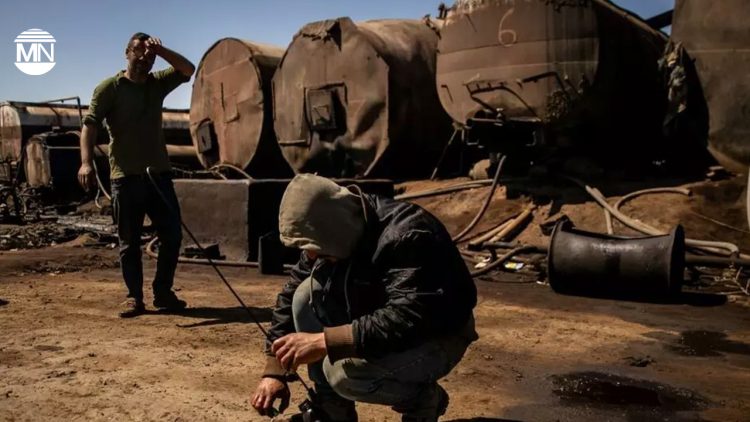North and East Syria (Rojava) suffers from extensive oil pollution caused by Turkish bombardments of oil refineries, significantly affecting rivers, fields, and air quality, and leading to an increase in cancer cases among residents.
A newly published report has exposed the devastating environmental toll of oil pollution in North and East Syria, known as Rojava, where communities near the Gir Zero oil fields are grappling with toxic air, rising cancer cases, and barren farmland. Written by journalist Philippe Pernot and released on Reporterre on 12 May, the investigation highlights how years of war, Turkish airstrikes, and neglected infrastructure have turned vital oil reserves into a source of ecological and public health disaster. The crisis now threatens both lives and the fragile future of the region’s post-conflict recovery.
“The air is totally unbreathable here. We have about 50 cases of cancer reported per 500 inhabitants. And we all have a tumour in us that just waits to reveal itself,” Ali Thelaj, a local nurse told Reporterre. Many families stated that relatives had suffered terminal diseases due to pollutants, while others showed skin ailments, among other symptoms.
Flowing from the Gir Zero fields is what’s known locally as the “river of death”, Pernot said. It is full of wastewater and petroleum, which is a direct result of Turkish bombardments of oil refineries and conflict-hampered regional development.
The Syrian Democratic Forces (SDF) and the Autonomous Administration of North and East Syria (AANES) have controlled most of Syria’s northeast oil field since 2017, after the defeat of the Islamic State (ISIS). Assad’s regime purchased oil from northern Syria even when those areas were not under regime control, trading in oil out of mutual necessity.
Much of the region’s economy relies heavily on oil reserves—since little else can be cultivated in the arid landscape. It was a bitter exchange between enemies: those living in Rojava had few other resources to sustain economic activity, and the Assad regime was fully aware of this, Pernod explained.
During the civil war, Assad and various militant groups financed their operations through the oil fields and refineries in the region. Safe and environmentally sound extraction practices were entirely neglected, the report noted, and the refineries became frequent targets of airstrikes by opposing forces. After the Kurdish-led forces recaptured the area, many of the refineries were deemed toxic and shut down.
Furthermore, the outdated infrastructure poses a major challenge and hinders the ecological goals of the Rojava Revolution, the region’s pioneering social movement emerging during the onset of the Syrian civil war in 2011. Various environmental initiatives have attempted to resolve the pollution issues and the extreme aridity of the land, but remain limited. While ongoing sanctions on Syria continue to restrict the region’s economic activity, crude oil remains an essential resource—still refined using these ageing machines and factories, despite the associated risks.
Meanwhile, Turkish forces have systematically bombed the refineries and power plants in Rojava, on one occasion early last year causing nearly one billion dollars of damage in a single attack, Pernod reported according to the power plant’s administration. The attack led to a major power blackout and widespread humanitarian crisis.
Mohammed Ahme, co-director of the environmental council in Qamishlo told Reporterre:
“Turkey deliberately targeted civilian infrastructure in north-eastern Syria with more than a thousand bombings. They targeted water treatment plants, dams, power plants and even bakeries and hospitals. These attacks generate enormous pollution (up to 200 kilometres around) and a cut in services affecting the lives of the region’s inhabitants.”
A catastrophe at the Oudah oil refinery was a particularly grim example of Turkish sabotage. Director Mohammad Sino recalled that the facility was bombed up to six times a day in December 2023. Journalists from Reporterre, who interviewed him, visited the site – destroyed by a missile on 15 January 2024 – and found it in ruins. When it was destroyed, approximately 35,000 barrels of oil spilled into the surrounding fields.
Farmers say that almost nothing grows there anymore. Nevertheless, Kongra Star, an AANES women’s organisation, managed to construct a greenhouse in the area after the spill and remain hopeful that the land can one day be fertile again. However, such a transformation will require far more than local initiatives alone.

